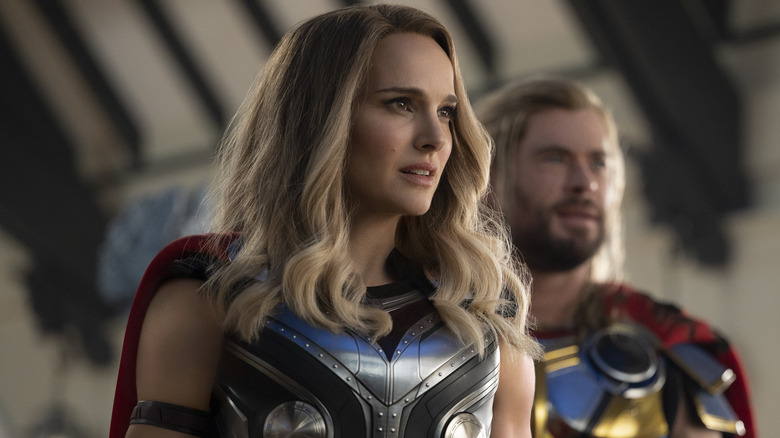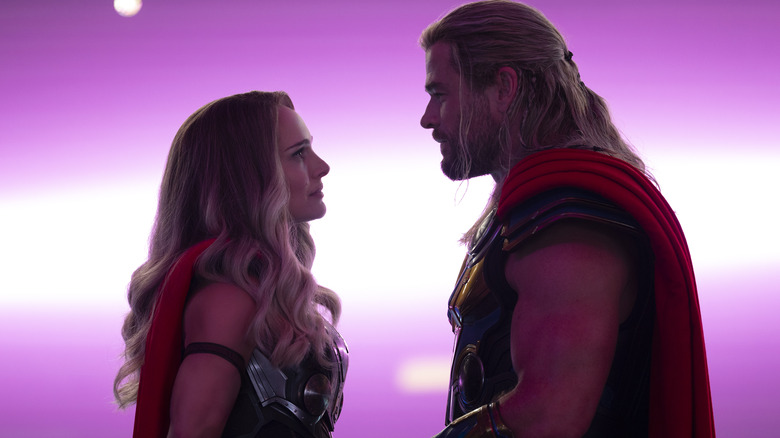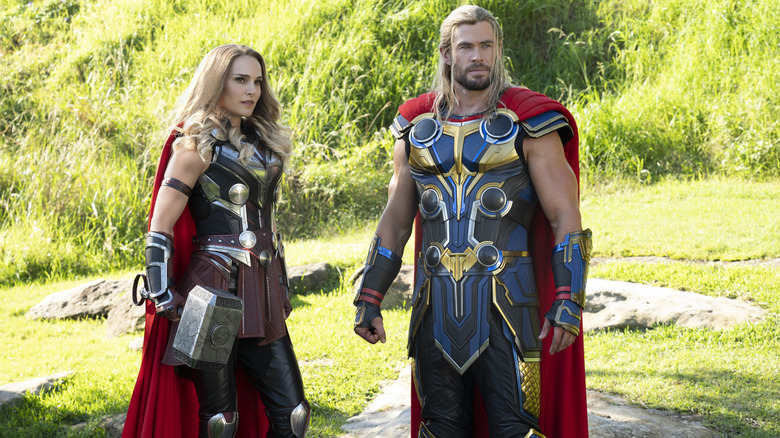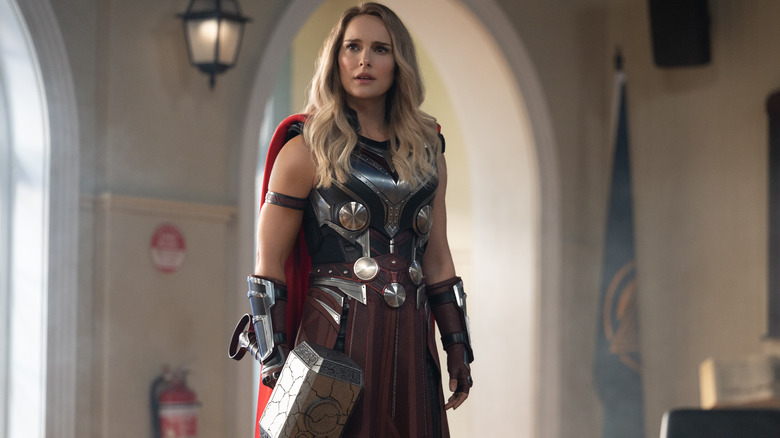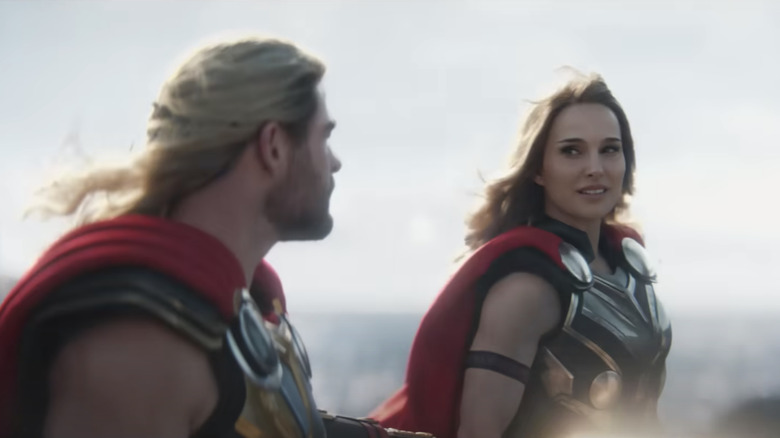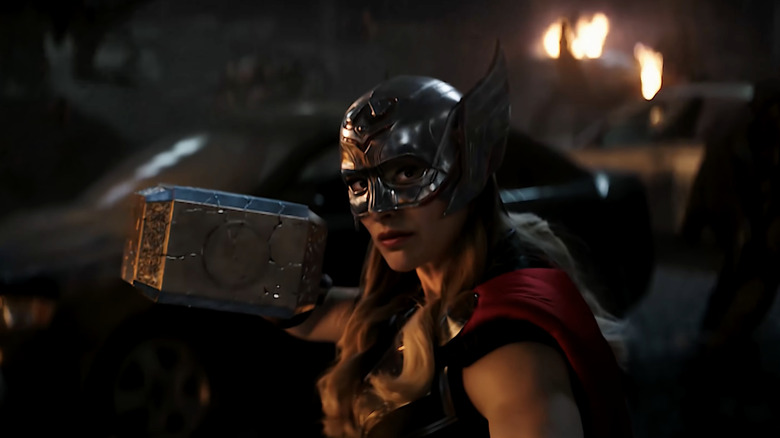How Thor: Love And Thunder Fails Natalie Portman's Jane Foster
"Just when I thought I was out, they pull me back in!"
Now, Michael Corleone may have been speaking about something far more serious than superhero films, but the sentiment certainly applies to the return of Natalie Portman in the Marvel Cinematic Universe. The Academy Award winner has been absent from the blockbuster behemoth since 2013's much disliked "Thor: The Dark World," and it looked like she was out for good. So many great actors get wrapped up in these multi-picture deals with Marvel that swallow so much of the performer's time that could be spent making other things. Take Elizabeth Olsen, for example, who has not made a non-MCU film since "Avengers: Infinity War."
But Natalie got out. She was free after an unpleasant experience with "The Dark World," where she was quite unhappy with the firing of Patty Jenkins off that project. In the years since, she's really showcased her wide-ranging abilities as a performer, from "Jackie" to "Annihilation" to "Vox Lux." However, in the almost 10 years since her last appearance, the MCU has only grown exponentially, and in their increased power, the thing they have latched onto as a sure way to hold onto that power is to mine the past. They have figured out that if you put a character in a movie that hasn't been seen in awhile, people are sure to clap and scream when they show up on screen, whether or not people even liked that character to begin with. The entirety of "Spider-Man: No Way Home" is built on this.
Well, the MCU got her back and put her in a Thor costume to make people pump their fists, but the end result leaves so much to be desired when it came to making that character compelling, the romance credible, and justify wasting Natalie Portman's time.
Spoilers ahead for "Thor: Love and Thunder."
Not laying the proper groundwork
The failure of Jane Foster begins well before "Thor: Love and Thunder." Though she is her own character, Jane's primary function in 2011's "Thor" is to be the romantic partner for the titular Norse god. They spend maybe a week together in that first film and have a chaste flirtation with each other, based mostly on the fact that each of them look the way they do. At the end of the film, though, Thor leaves Earth and heads back to Asgard. In "The Dark World," they reunite under the circumstances of her being infected with the Aether, not having seen each other since the first film. We are meant to feel some kind of unrequited longing between the two, but because we have seen Thor return to Earth between the two films in "The Avengers," it feels more like he doesn't think the relationship is all that important. Their connection in "The Dark World" comes from survival, not romance. In the post-credits scene, it does show that the two look like they are about to start a life together, but we see no fruits of that set-up, since Portman jumps ship.
"Thor: Ragnarok" exists solely to "course correct" the series into something even more goofy and less earnest than it already was. Everything that happened in those first two movies we can laugh at for how dumb it was. Now, Thor is cool and fun (supposedly). That includes the supporting cast. Taika Waititi kills off the Warriors Three and Odin, and doesn't bring back Portman, Kat Dennings, or Stellan Skarsgård, providing room to introduce Valkyrie, Korg, and more. So, bringing back Natalie Portman as the grand love story of Thor's life is going to feel hollow because we have already moved so far past that.
Marvel's poor track record with romance
Marvel has been praised up and down for their handle on casting and characterization. They have enlisted a cavalcade of actors adept at delivering screen charisma with a hint of cheekiness, working in broad strokes to be entertaining. Consequently, their modus operandi has drifted into the realm of trying to avoid planting their flag in a realm of open-hearted earnestness. In place of emotion, they implement irony. The biggest casualty to this way of storytelling has been romance. Much has been talked about the utter lack of sex in the MCU, but you can still tell love stories without sex. Unfortunately, Marvel is quite poor at that.
The MCU has adopted a "tell don't show" mentality for love stories. They think as long as they tell us two people are in love, we will believe them. Thor and Jane, Doctor Strange and Christine, Wanda and Vision, Tony and Pepper. Any progression or tumult that occurs within these couples happens off-screen. For Tony and Pepper, they both break up and get back together between films. It took until Vision died before Marvel took the time to explore that relationship.
In "Thor: Love and Thunder," Waititi's Korg narrates a montage of Thor and Jane's relationship. Prior to this film, we never saw their home life or anything. In these few minutes, we are meant to completely reconfigure how we have seen the last 10-plus years of Thor in regards to Jane. Just because you tell me something doesn't mean I'm going to believe it. Seeing Thor and Jane comically roller skate together doesn't make up for years of no development. In a single film, you can get away with barebones love story, but in a series, you need to continuously build. They do not.
Cancer as a crutch
For fans of the comics, it should come as no surprise that Jane Foster transforming into The Mighty Thor comes as a result from her having cancer. On principle, I have no issue with this very comic-booky set up. Nearly every story within the Marvel universe involves some kind of scientist experimenting on themselves that gives them superpowers. The difference between the two is time.
Jane Foster was first introduced in the comics all the way back in 1962 and did not become The Mighty Thor in the mainline comic series until 2014 under the stewardship of Jason Aaron. That means Jane had over 50 years of stories with Thor before she wielded the hammer. After that amount of time, having a character get diagnosed with cancer is a gigantic gut punch, as we have spent so much time invested in their up and down relationship with each other. "Thor: Love and Thunder" doesn't earn this development in the slightest.
When we are reintroduced to Jane, she is in the middle of a round of chemotherapy, battling Stage 4 cancer. Instead of being a further complication in the lives of these people we have known forever, the cancer here feels more like a quick way to get us invested in a character we haven't seen in almost a decade. It places on an expiration date on a possible relationship with Thor to artificially inflate the stakes. Having her die gives Marvel the opportunity to both bring back a familiar face to give the audience some cheap "I remember that!" thrills while also not needing Portman to stick around long term. Battling cancer is serious business, as several members of my family can attest, and using it as an emotional shortcut is lazy, more than anything else.
Oh, and now she's dead
Aside from the recognizability factor, the reason to bring back Jane Foster is to have her don the moniker of The Mighty Thor, but it doesn't even do that justice. I know everyone is sick of origin stories, but seeing the evolution of Jane as Thor is incredibly important for connecting us to that character. We see the broken pieces of Mjolnir move in her presence, and next thing we know, she has apparently been kicking butt for some not insignificant amount of time. We see no growth with her coming to terms with her new powers or the fact that she now magically transforms into the visage of her former lover.
Then they have the gall to kill her off at the end of the movie, cutting off at the knees any potential for her to have further adventures as The Mighty Thor. While I am grateful for that because Portman will have time to make other projects, it robs a superhero of a key element of its success: serialization. The MCU only makes time to explore the inner lives of its principal superhero core, and having Portman come in as The Mighty Thor looked to be a wonderful opportunity to make some movies to finally flesh out Jane Foster and give Portman opportunity to shine. Unfortunately, "Thor: Love and Thunder" removes all that potential, both upfront and on the back end, for that exploration by bungling the origin and taking her off the board, unless they really want to bring in the afterlife.
From passing the hammer to fridging
Marvel has rightly been criticized for the lack of big screen female superheroes. We have only had two MCU films headlined by women with "Captain Marvel" and "Black Widow," the latter of which took 11 years to hit theaters after the character was first introduced. The Mighty Thor has been an immensely popular character in the comic books and is key to Jason Aaron's much lauded run on the series. The marketing was built around having Natalie Portman as a superhero while Chris Hemsworth's Thor was searching for some new lease on life, even ending the trailer on the reveal of her wielding Mjolnir. This was the perfect opportunity for the MCU to delve into something the comics regularly do: legacy heroes, something they are already doing with Anthony Mackie taking over as Captain America.
But Marvel isn't interested in The Mighty Thor. They're interested in Thor. The only reason they wanted to use The Mighty Thor was for the purposes of developing Thor. Her cancer matters because of how it affects Thor. Her death matters because of how it motivates Thor. Jane Foster is a renowned scientist who becomes a superhero, and her purpose is to die so Thor can realize he has love in his heart. "Thor: Love and Thunder" wants the credit for having a female superhero, but they put her through all the ugly tropes plaguing so many of these movies. Jane is still a threadbare idea of a woman who gets fridged, despite the costume and lightning powers. She isn't her own woman.
Jane Foster should remain in Valhalla. There is no need for Marvel to bring her back to, once again, not know how to utilize the character, and quite frankly, Natalie Portman doesn't need the MCU either.
